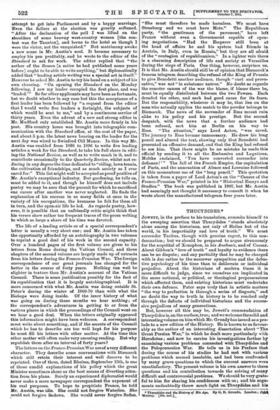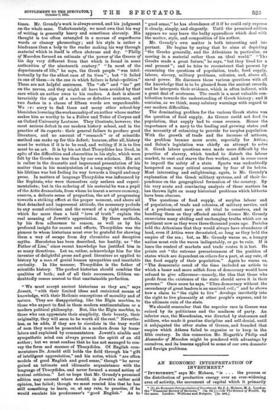THUCYDIDES.*
JOWETT, in the preface to his translation, commits himself to the sweeping assertion that Thucydides "stands absolutely alone among the historians, not only of Hellas but of the world, in his impartiality and love of truth." We must surrender Tacitus, though with genuine regret, to this con- demnation ; but we should be prepared to argue strenuously for the acquittal of Xenophon, in his Anabasis, and of Caesar. About Gibbon's "love of truth" and loyalty to evidence there can be no dispute; and any partiality that he may be charged with is due rather to the narrower sympathies and the defec- tive psychology of his time than to deliberate or individual prejudice. About the historians of modern times it is more difficult to judge, since we ourselves are implicated in the same national, or political, or theological prepossessions which affected them, and existing historians must undertake their own defence. Pater says truly that in artistic matters "the way to perfection is through a series of disgusts," and no doubt the way to truth in history is to be reached only through the defects of individual historians and the succes- sive prejudices of many generations.
But, however all this may be, Jowett's commendation of Thucydides is, on the surface, true; and we welcome the solid and interesting volume on him which Mr. Grundy has issued as a pre- lude to a new edition of the History. He is known to us favour- ably as the author of an interesting dissertation about "The Great Persian War," in which he dealt more particularly with Herodotua ; and now he carries his investigations farther by examining various problems connected with Thucydides and the Peloponnesian War. He tells us in his Preface that during the course of his studies he had met with various problems which seemed insoluble, and had been confronted by many grave questions to which the current answers were unsatisfactory. The present volume is his own answer to these questions and his contribution towards the solving of many difficult and controversial problems. We should be very grate.. ful to him for sharing his confidences with us ; and his argu- ments undoubtedly throw much light on Thucydides and his
• Thucydides and the History of His Age, By G. B. Grundy. London ; Murray. E16s. net.L
times. Mr. Grundy's work is always sound, and his judgment on the whole sane. Unfortunately, we must own that his way of writing is generally heavy and sometimes slovenly. His thought is too often entangled in a morass of superfluous words or clumsy phraseology ; and his style is rather a hindrance than a help to the reader making his way through material which in itself is often abstruse and dry. "Philip of Macedon formed an estimate of the power of the Greece of his day very different from that which is found in some authorities of the nineteenth century." " In most of the departments of life," he says, the Greek people " was intel- lectually by far the ablest race of its time " ; but "it failed in one of them—in the one in which failure is fatal—politics." These are not helpful sentences. The " ofs " and "ins" get on the nerves, and they might all have been avoided by that care which an author owes to his readers. A dash is almost invariably the sign of a careless or defective sentence, and two dashes in a clause of fifteen words are unpardonable. We rr. ) sorry to find these and many other school-boy blemishes lowering the workmanship of an author whose matter makes him so worthy to be a Fellow and Tutor of Corpus and an Oxford University Lecturer. They illustrate, however, the most serious defect in our modern history school, and in the practice of its experts : their general failure to produce good literature, and no amount of "research" or of scientific method can make up for this defect; because, after all, history must be written if it is to be read, and writing if it is to live must be an art. It is by his art that Thucydides has lived, in spite of the difficulties and obscurities in his style, which were felt by the Greeks no less than by our own scholars. His art is rather in the dramatic and impersonal presentation of his matter than in his manipulation of a language which during his lifetime was but feeling its way towards a limpid and easy prose. In matters of language Thucydides was influenced by the Sophists, who were themselves only seekers and experi- mentalists ; but in the ordering of his material he was a pupil of the Attic dramatists, from whom he learnt a severe economy, reserve, a delicate sense of proportion, the art of progressing towards a striking effect at the proper moment, and above all that detached and impersonal attitude, the necessary prelude to any sound criticism and the reward of a right scepticism which far more than a bald "love of truth" explain the real meaning of Jowett's appreciation. By these methods, by his firm adherence to reason, as well as by his profound insight for causes and effects, Thucydides was the pioneer to whom historians must ever be grateful for showing them a way of escape from dry chronicles and deceptive myths. Herodotus has been described, too hastily, as "the Father of Lies," since recent knowledge has justified him in so many directions. Let us, rather, acknowledge him for the inventor of delightful prose and good literature as applied to history by a man of genial human sympathies and insatiable cariosity. In like manner, Thucydides is the father of scientific history. The perfect historian should combine the qualities of both; and of all their successors, Gibbon un- doubtedly comes nearest to that unattainable perfection.
" We must accept ancient historians as they are," says Jowett, " with their limited ideas and restricted means of knowledge, with their Hellenic conceptions of morality and of nature. They are disappointing, like the Elgin marbles, to those who expect to find in them modern sentimentalism or a modern political philosophy. But, like the Elgin marbles, to those who can appreciate their simplicity, their beauty, their originality, they will seem to be worth all the rest." Neverthe- less, as he adds, if they are to circulate in the busy world of men they must be presented in a modern dress by trans- lators and explained by commentators. Jowett's nimble and sympathetic mind can always present the spirit of an old author; but we must confess that he has not managed to con- vey the form and manner of Thucydides. Of English com- mentators Dr. Arnold still holds the field through his "gift of intelligent appreciation," and his notes, which " are often models of good English and good sense," though "he never gained an intimate and idiomatic acquaintance with the language of Thucydides, and never formed a sound notion of textual criticism." Let us hope that Mr. Grandy's promised edition may succeed where Arnold, in Jowett's rather acid opinion, has failed; though we must remind him that he has still something to learn, or, at any rate, to practise, if he would emulate his predecessor's "good English." As to " good sense," he has abundance of it if he could only express it clearly, simply, and elegantly. Until the promised edition appears we may leave the bulky appendices which deal with the matter, style, and composition of his author.
Mr. Grundy's own matter is both interesting and im- portant. He begins by saying that he aims at depicting "the Greeks generally, and the Athenians in particular, as moving in a material rather than an ideal world." "The Greeks made a great future," he says, "but they lived for a real present "; and he tries to reconstruct that present by examining the questions of population, trade, food supply, labour, slavery, military problems, colonies, and, above all, naval power. He discusses these various questions with all the knowledge that is to be gleaned from the ancient records, and he interprets their evidence, which is often indirect, with a great deal of acuteness. The result is a most valuable con- tribution towards the understanding of Greek history ; and it contains, as we think, many salutary warnings with regard to our modern difficulties.
The dominating problem for the various Greek states was the question of food supply. As Greece could not feed its population, that supply had to come oversee. Hence the importance of a navy to the leading and growing states and the necessity of colonizing to provide for surplus population. With the growth of trade and the increase of artisans, the problem became more acute, especially for Attica ; and Solon's legislation was chiefly an attempt to solve it. Greek labour questions were made more difficult by the practice of slavery, which tended to disturb the labour market, to oust and starve the free worker, and in some cases to imperil the safety of a state. Sparta was undoubtedly hampered on many critical occasions by fear of its helots. Most interesting and enlightening, again, is Mr. Grundy'a explanation of the Greek military systems, and of their de- pendence on the geographical formation of the country. By his very acute and convincing analysis of these matters he has thrown light on many historical problems which hitherto have been obscure.
The questions of food sappily, of surplus labour and of population, of trade and colonies, of military service, and of a predominant navy are all vital to ourselves, and in handling them as they affected ancient Greece Mr. Grundy enunciates many abiding and unchanging truths which are as pertinent now as they were three thousand years ago. Pericles told the Athenians that they would always have abundance of land, even if Attica were devastated, so long as they held the empire of the sea ; bat, as Mr. Grundy warns us, a hungry nation must rule the waves indisputably, or go to ruin. If it loses the control of markets and trade routes it is lost. He points out " the extreme precariousness of the position of states which are dependent on others for a part, at any rate, of the food supply of their population." Again he warns us, " The democratic creed of the time included an article to which a baser and more selfish form of democracy would have refused to give adherence—namely, the idea that those who profit from the existence of the state should serve it in their persons." Once more he says, "Ultra-democracy without the ascendency of great leaders is an unmixed evil ; " and he shows how a claim to " the right to live " develops inevitably into the right to live pleasantly at other people's expense, and to the ultimate ruin of the state.
We should remember that the superior race in Greece was ruined by its politicians and the madness of party. An inferior race, the Macedonian, was directed by statesmen and soldiers, who made it practise discipline and self-denial, until it subjugated the other states of Greece, and founded that empire which Athens failed to organize or to keep in the fifth century. In this connexion Mr. Hogarth's Philip and Alexander of Macedon might be pondered with advantage by ourselves, and its lessons applied to some of our own domestic and foreign problems.































































 Previous page
Previous page